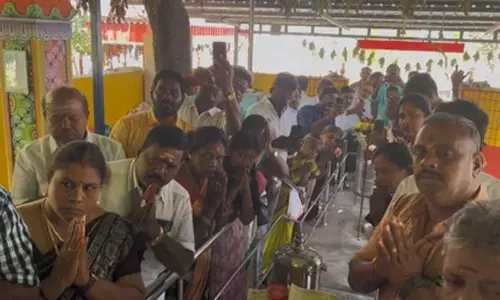Food poisoning vs stomach flu: Know the difference
Share :

The change of season can bring with it a unique set of challenges, one of which is the increased risk of gastrointestinal issues like stomach flu and food poisoning.
New Delhi: The change of season can bring with it a unique set of challenges, one of which is the increased risk of gastrointestinal issues like stomach flu and food poisoning. While they may share some common symptoms, it's crucial to recognise the differences between stomach flu and food poisoning. This article will empower you with the knowledge to distinguish between the two and seek appropriate care when needed.
Stomach Flu (Viral Gastroenteritis)
Stomach flu, more accurately termed viral gastroenteritis, is primarily caused by viral infections. Viruses such as norovirus, rotavirus, and adenovirus are the usual culprits behind stomach flu cases. These viruses are highly contagious and can spread through various means, including direct contact with an infected person, consuming contaminated food or water, or touching contaminated surfaces and then touching your mouth. Stomach flu earns its name due to the inflammation it triggers in the stomach and intestines. It is essential to remember that stomach flu is not the same as influenza or the seasonal flu that affects your respiratory system.
Food Poisoning
Food poisoning, on the other hand, results from consuming contaminated food or liquids. The contamination can come from harmful bacteria, parasites, toxins, or chemicals. This contamination can occur during food production, processing, or handling. Some well-known bacteria notorious for food poisoning include Salmonella, E. coli, and Campylobacter. The symptoms of food poisoning occur as your body's reaction to these harmful microorganisms and the toxins they produce.
Recognising the symptoms
Stomach Flu: Stomach flu typically presents with a range of symptoms that include nausea, vomiting, diarrhea, abdominal cramps, and occasionally a low-grade fever. The onset of symptoms is often sudden and can vary in intensity but generally subside within a few days.
Food Poisoning: Food poisoning can manifest with a diverse array of symptoms, largely depending on the specific contaminant ingested. Common symptoms include nausea, vomiting, diarrhea (which can sometimes be bloody), abdominal pain, fever, and muscle aches. Unlike stomach flu, where the onset is often rapid, food poisoning symptoms might take a few hours or even days to appear after consuming contaminated food.
Key differences
Onset and Duration: Stomach flu tends to strike suddenly, with symptoms appearing within a relatively short time frame after exposure to the virus. However, these symptoms generally resolve within a few days (1 to 3 days). Food poisoning symptoms, on the other hand, can appear within hours or days after consuming contaminated food and can persist for varying durations, ranging from a few hours to several days.
Fever: While both stomach flu and food poisoning can lead to fever, it is more common in cases of food poisoning, particularly if bacteria are the underlying cause.
Nature of Vomiting and Diarrhea: Stomach flu-related vomiting and diarrhea are often more watery and less intense compared to food poisoning. In food poisoning, these symptoms can be severe, accompanied by significant discomfort and, in some cases, blood in the stool.
When to seek medical attention
Stomach Flu: In most cases of stomach flu, medical intervention might not be necessary. Adequate rest, hydration, and consumption of simple, easily digestible foods can help manage the condition. However, if you experience severe symptoms, persistent vomiting, signs of dehydration (such as dry mouth, dark urine, or dizziness), or if your symptoms do not improve within a few days, do consult a doctor.
Food Poisoning: Medical attention may be warranted for cases of food poisoning, especially if symptoms are intense or prolonged. Severe symptoms, including persistent vomiting, high fever, severe abdominal pain, bloody diarrhea, or signs of dehydration, should not be ignored. Some cases of food poisoning might require antibiotics or other medical interventions eg. Intravenous fluids, so seeking medical care is crucial for proper diagnosis and treatment.
Preventing stomach flu and food poisoning
Practicing good hygiene is pivotal in preventing both stomach flu and food poisoning. Wash your hands thoroughly before handling food or eating, avoid consumption of under cooked or raw foods, and opt for clean, safe drinking water. Properly storing, handling, and cooking food can significantly reduce the risk of contracting these preventable ailments.
While stomach flu and food poisoning may make their appearance during the monsoon season, it's important to remember that they are distinct entities with different causes and characteristics. Armed with knowledge about their origins, symptoms, and potential severity, you can make informed decisions regarding self-care and when to seek medical attention. Emphasizing preventative measures such as proper hygiene practices and safe food handling is the cornerstone of safeguarding yourself and your loved ones from these uncomfortable and avoidable health concerns.
(Dr Dhiraj Bhattad is a Consultant-Internal Medicine at Sir HN Reliance Foundation Hospital)













